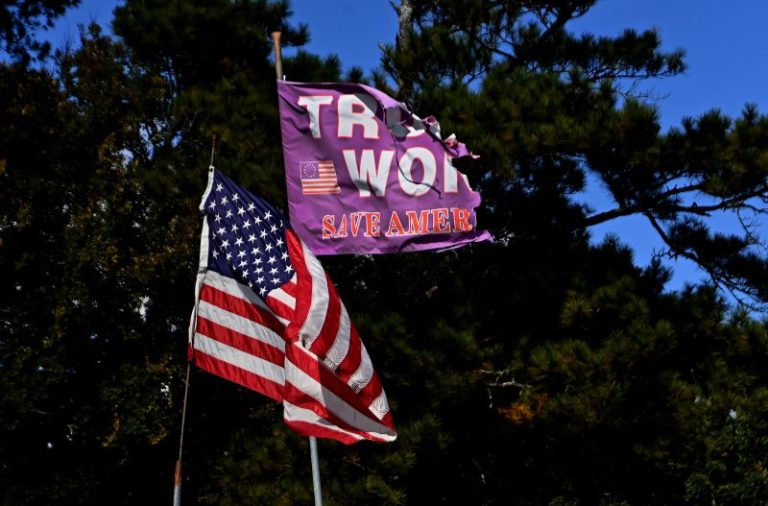If the 2024 presidential election were held today, it’s not clear who would win. Vice President Kamala Harris has a slight national advantage, according to The Washington Post’s average of polls, but margins in swing states are uniformly narrow. If the polls are overestimating Harris’s support, Donald Trump will return to the White House. If they are underestimating her support, she’ll be the next president.
Unless, of course, there’s some successful, anti-democratic effort to subvert her victory. An effort that a quarter of Republicans and 1 in 7 Americans overall think should be undertaken in the event that Trump loses.
That’s the determination of new national polling from PRRI. But before we dig into that, it’s useful to look at a different newly released poll, this one from the Associated Press and its partners at NORC and USAFacts.
In that poll, Americans were asked what information sources they trusted when it came to accurately reporting the results of the presidential election. The source that engendered the most trust (here reflecting the percentage of people saying they had at least a moderate amount of trust) was the certified results produced by government agencies. Local news sources, television and newspapers, were the next most trusted, followed by national news outlets. The candidates and their campaigns were among the least trusted — particularly Trump’s campaign.
Except that, among Republicans, Trump and his campaign were the most trusted source of election information. And by a healthy margin.
What’s important about that chart, though, isn’t simply that Trump is viewed as the most trustworthy source of information about the election. It’s that this is in part because the other sources of information are given so little trust (particularly when compared to Democrats). It’s not that trust is generally high among Republicans, with Trump emerging as the most confidence-inspiring. It’s that trust is broadly low, except in Trump.
This is an outcome Trump has been specifically working toward. Injecting skepticism into even obviously objective presentations and elevating doubt about institutions — exaggerated or not — reinforces his position as the sole trustworthy authority to his supporters.
It is a foundational element of authoritarian leadership.
Which brings us back to that PRRI poll. In it, Americans were presented with a number of questions aimed specifically at measuring authoritarian sympathies. One measure, what the researchers refer to as the “Right-Wing Authoritarianism Scale” (RWAS), measured respondents’ agreement with four statements:
The only way our country can get through the crisis ahead is to get back to our traditional values, put some tough leaders in power, and silence the troublemakers spreading bad ideas.
Our country will be destroyed someday if we do not smash the perversions eating away at our moral fiber and traditional beliefs.
What our country really needs is a strong, determined leader who will crush evil, and take us back to our true path.
Our country will be great if we honor the ways of our forefathers, do what the authorities tell us to do, and get rid of the “rotten apples” who are ruining everything.
Those who completely or mostly agreed with most or all of the statements were rated as having high scores. A parallel measure, referred to as the “Child-Rearing Authoritarianism Scale” was evaluated in a similar way.
In each case, about 4 in 10 Americans received high scores. But, in each case, those scores were higher among Republicans. They were sharply higher among Republicans who view Trump favorably, a group that makes up most of the party. Three-quarters of Trump-supporting Republicans scored high on the RWAS measurement.
PRRI also presented respondents with specific situations aimed at measuring their willingness to set aside democratic processes. About a quarter of Republicans said that Americans needed to “ensure the rightful leader takes office” if 2024 is “compromised by voter fraud” — including taking violent actions. The same percentage said that Trump should “do whatever it takes” to become president if he isn’t confirmed as the winner in November.
The predicate for that first question — that the election is compromised by voter fraud — should be considered in light of the AP poll responses. Trump spent the months after losing in 2020 insisting that he had won; he has spent the years since insisting that somehow-undetected rampant fraud cost him victory. And this is the most-trusted source for election information among Republicans.
New polling from Pew Research Center, incidentally, asked Americans to evaluate Trump’s response to 2020. Nearly half said that Trump broke the law in attempting to retain power; a majority said that he had at least done something wrong.
A majority of Trump supporters said that he hadn’t done anything wrong at all.
Pew also asked people to evaluate possible actions that their preferred presidential candidates might take if elected. Supporters of both Harris and Trump thought it was acceptable for their preferred candidate to take executive actions if elected to get around congressional inaction. But Trump supporters were far more likely than Harris supporters to say that it was acceptable for their preferred candidate to launch targeted political prosecutions, fire disloyal federal workers or to pardon friends and family accused of crimes.
Trump, of course, has promised to fire federal officials and launch criminal probes of political opponents — including those elections officials who he suggests might engage in “fraud.”
All of these numbers have a consistent theme: Many Republicans, particularly those who like Trump, accept and support his authoritarian tendencies. That holds even as Trump’s articulation of his second-term plans tend more overtly in that direction.

